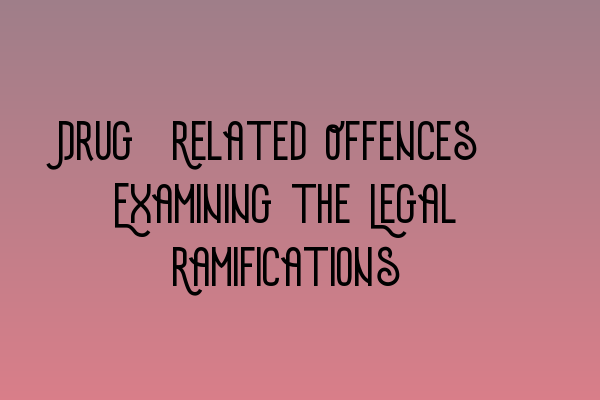Drug-Related Offences: Examining the Legal Ramifications
Drug-related offences are a serious matter that can have significant legal ramifications for those involved. In this article, we will explore the various aspects of drug offences, including the types of crimes, the potential penalties, and the importance of obtaining legal representation.
Types of Drug-Related Offences
Drug offences encompass a wide range of illegal activities, including drug possession, drug trafficking, drug cultivation, and drug manufacturing. Each offence carries its own set of legal consequences, varying in severity depending on factors such as the type and quantity of drugs involved.
Drug possession is one of the most common drug-related offences. It refers to the act of having illicit drugs in one’s possession without a valid prescription or authorization. The severity of the offence typically depends on the classification of the drug and the quantity found.
Drug trafficking involves the transportation, distribution, or sale of illegal drugs. This offence is considered more serious than possession as it directly contributes to the spread of illicit substances within communities.
Cultivating and manufacturing drugs, such as cultivating marijuana plants or producing methamphetamine, are also punishable offences. These activities are often associated with organized crime and can lead to lengthy prison sentences.
Potential Penalties
The penalties for drug-related offences can vary widely depending on the specific circumstances of the case and the applicable laws. Factors such as the type and quantity of drugs, the offender’s criminal history, and any aggravating factors can influence the severity of the punishment.
Common penalties for drug offences include fines, probation, community service, mandatory drug education programs, and imprisonment. The length of imprisonment can range from months to decades, depending on the seriousness of the offence.
In some instances, drug offences may result in asset forfeiture, where the government seizes property or assets believed to be acquired through the proceeds of drug crimes. This includes money, vehicles, real estate, and other valuable assets.
The Importance of Legal Representation
When facing drug-related charges, it is crucial to seek legal representation from a qualified criminal defense solicitor. A skilled solicitor can provide guidance throughout the legal process, protect your rights, and work towards achieving the best possible outcome for your case.
Drug laws can be complex, with varying statutes and regulations at the national and regional levels. A knowledgeable solicitor can navigate these laws and build a solid defense strategy tailored to your unique circumstances.
It is essential to note that drug-related offences can have far-reaching consequences beyond the immediate legal ramifications. Convictions can impact employment opportunities, educational prospects, immigration status, and personal relationships. Having a dedicated solicitor to advocate for your interests can make a significant difference in mitigating these collateral effects.
At SQE Criminal Law & Practice Law UK, we understand the complexities and seriousness of drug-related offences. Our team of experienced solicitors is well-versed in handling all aspects of drug offences, from initial arrest to court proceedings. We are committed to protecting your rights and ensuring the best possible outcome for your case.
If you require legal representation for drug-related offences or any other criminal matters, contact SQE Criminal Law & Practice Law UK today. Our expert solicitors are here to provide you with the professional assistance you need.
